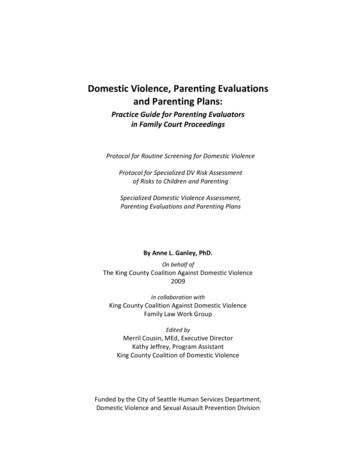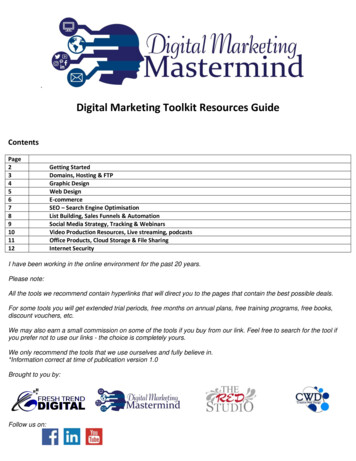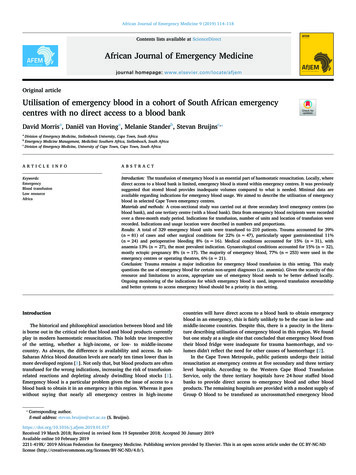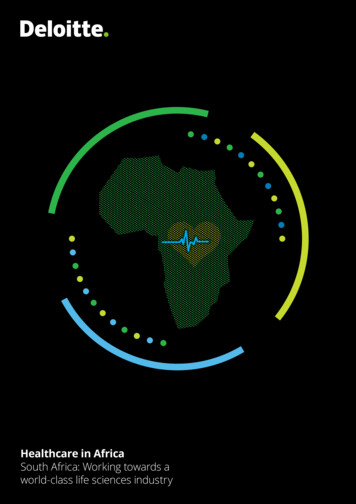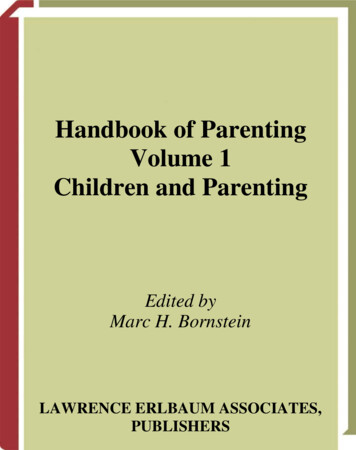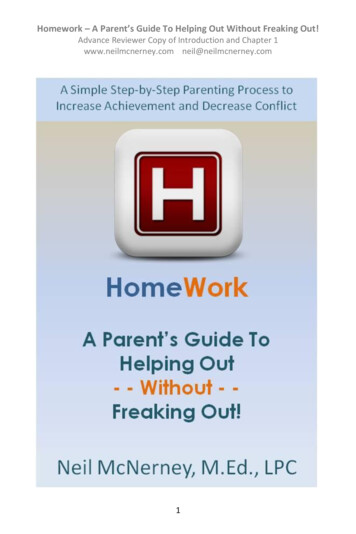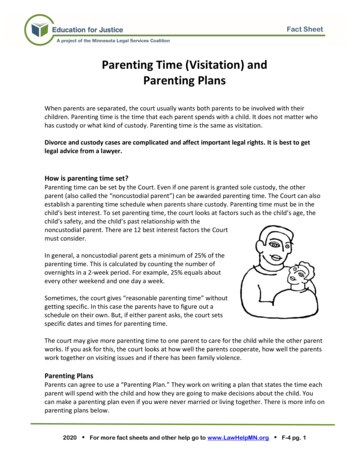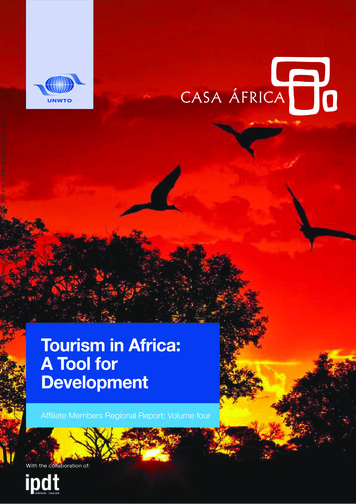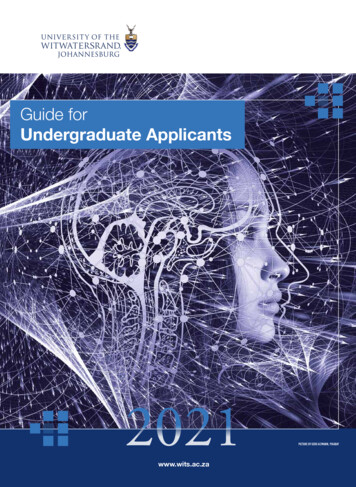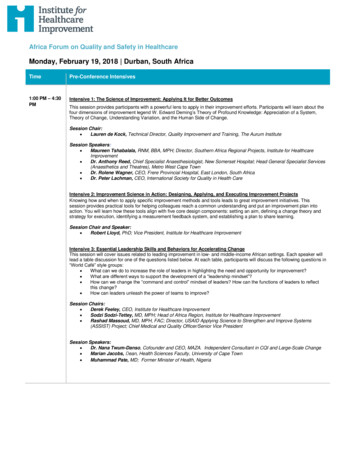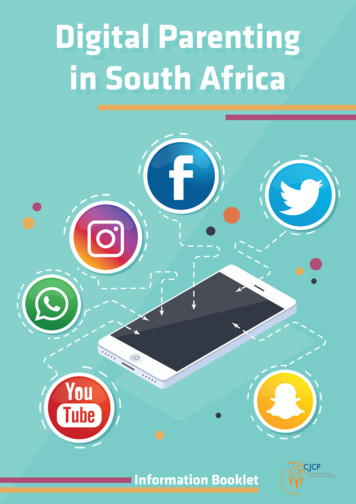
Transcription
DigitalDigital ParentingParentinginin SouthSouth AfricaAfricaInformation Booklet
?What is digital parenting?Most young people regularly usecommunication devices, and theamount of time that children spendonline is increasing. This raisesimportant questions and concernsabout how children are affected bytheir exposure to the internet.One such important concern is therole played by parents in deciding howtheir children use the internet. Parentsare often the people who providechildren with their first device ordecide at what age a child is allowedto start using the internet. This meansthat, sometimes without even realisingit, parents are the most importantpeople in determining the nature oftheir children’s early experiences ofthe internet and the kinds of activitiesthey engage in online.Digital parenting is the term thatdescribes how parents manage theirchildren’s internet use once they startusing the internet. While many peoplethink that digital parenting is abouthaving technical knowledge andteaching their children how to usetechnology, good digital parenting isoften more about ensuring that therules for good behaviour that manyparents put in place offline, are alsoapplied to life online. Some parentsmay have the knowledge to help theirchildren with technical problems andsome don’t, but all parents have theability to teach their children howto navigate danger and be ethical,responsible citizens.meet new peersHELPSCHILDRENWITHSCHOOLWORKChildren spendingtoo much time online1Digital Parentingin South AfricaCurrently, little is knownabout how the internetis being used by childrenin South Africa, orhow parents interactwith their childrenabout such things,making it difficult todetermine whether thesetechnologies are beingused in the best andsafest ways. The Centrefor Justice and CrimePrevention (CJCP) recentlycompleted two research studieslooking at these issues in order to gainmore information and understandingabout the topic. These two studiesshowed us that parents face manychallenges when trying to managetheir children’s internet use in SouthAfrica. This new information hashelped uncover these problems, andhas made it possible to find solutionsspecific to South African parents’ andchildren’s THAFRICAAFRICAPosting too muchpersonal informationRisks or opportunities?Parents provide for and allow theirchildren use of technology becausethey see how it can benefit them. Atthe same time, parents are also awareof a number of disadvantages andpotential harms which can result fromthis use. Balancing these risks andopportunities is often the best wayto ensure that children can benefitfrom the internet. However, it can bedifficult to know what is dangerousfor children online, and riskysituations can also come withopportunities. In our research weasked some parents what they likeabout the internet for their childrenand what they worry about, and insome cases these were the same things.This shows that a risk is often anopportunity from another perspective,and this highlights how difficult itcan be for parents to make sure thattheir children use the internet in away that does not harm them. For thisreason, it is also important for parentsto remember that risks are differentto actual harm. Children exposed to arisk, like meeting a stranger or seeingviolent videos, are not always harmedby the experience. It is very difficulttomeasure harms, but research fromcountries in the global North whereinternet use is very widespreadsuggests that very few child internetusers are actually harmed by the risksthey are exposed to online.Childrenhave thec chance to
HiGOTCHA!Risks parents worry about whentheir children use the internetOpportunities parents are happythe internet gives their childrenTheir children meeting dangerous strangers.Their children having the chance to meet new people.Children spending too much time online.The internet keeping children busy and occupied.Neglecting their schoolwork because of the internet.The internet helping children with their schoolwork.Posting too much personal information.Helping children share their lives and expressthemselves.What is the goal of digitalparenting?The goal of digital parentingis to make sure that childrenare using the internet in a waythat minimises the harms theyexperience and maximises thebenefits the internet gives tothem.Part of this is to teach children to beskilled and resilient internet usersand good digital citizens. What thismeans is that parents help theirchildren to learn how to navigatethe dangers on the internet, so thatevery time they use the internet, theyhave the knowledge and experiencethey need to avoid experiencingharm. Being a good digital citizen isalso vital because it means childrenwon’t harm other people online.That is, parents have a role to play inteaching children to be empatheticand thoughtful internet users, thekind of people who won’t cyberbullyor say something online that damagestheir reputation permanently.Teaching children to be resilientand empathetic depends on parentscreating the type of relationship withtheir children that allows for opencommunication, where children feelfree to approach their parents for helpif they experience something onlinewhich bothers them or have donesomething that bothers others.How can I parent digitally?Parental mediation refers to ways inwhich parents try to manage theirchildren’s use of technology. Researchhas found that parents parent digitallyin a number of ways, including: Watching and checking whattheir children do online(monitoring);Using technical tools to block,filter or monitor what children doonline (technical mediation);Setting rules that limit theirchildren’s internet use, usuallywithout taking into accountthe children’s wishes (restrictivemediation); andHaving conversations withchildren about their onlineactivities and about online safety(active mediation).Each of these methods has advantagesand disadvantages and some arebetter at making sure children aresafe while others help children accessmore opportunities. For this reason,it is important that a balance is foundbetween monitoring and managingyoung people’s online behaviour,while also allowing them thefreedom to handle their internet useresponsibly. Parents need to be carefulwhen navigating this - allowingtheir children independent onlineexploration, while still providingappropriate parental support.However, many parents do not feelcertain about how best to do this, anda number of factors - such as lack oftime, resources and knowledge – maymake it even more difficult to findthis balance.One specific challenge faced by manyparents is that their children aremore technically knowledgeable andskilled on the internet than they are,making managing children’s onlineactivity especially difficult. Althoughthe solution here might appear tobe increasing the digital skills ofparents (and this would certainlyhelp), this may not always be possible.Instead, online parenting should beapproached in the same way thatoffline parenting should be done –by developing safe, stable, open andnurturing relationships betweenparents and their children, focusingon bringing up confident, responsible,empathetic and resilient youngmembers of society, whether on- oroff-line.Tips for parentsMany parents face daily battlestrying to manage their children’sinternet use and the idea of beinga successful digital parent can seemtotally unachievable. However, thereare many resources available to helpparents with this daunting task,starting with the tips below. Talk to your children!Make digital life part of theeveryday conversations you havewith your children. Encouragethem to speak to you about whatthey do online and do your bestto avoid appearing judgemental.This will make it easier for yourchildren to talk to you if they areharmed in some way online. not harm others.Teach your children to becritical thinkers online, interms of recognising advertising,Realise that you are going tohave to use differentstrategies for each of yourchildren depending on theirage. Younger children maybenefit from you explaininghow to use different tools safely,for example, while older childrenmay already know such things. Aone size fits all approach mayprevent older children fromlearning skills and accessingopportunities, and allow youngerchildren to be exposed to risksthey do not yet know how tonavigate.Learn more about thetechnology being usedby your children– learn with them and allow themto teach you and help youunderstand what they are doingonline.Teach your children that whilethey have the right to use theinternet, to benefit from it andto be safe in doing so, they alsohave the responsibilityto do so in ways that doonline behaviour whilealso allowing them to handletheir online life responsibly.biased or false information andgossip when they see it. Remindyour children that they shouldnot believe everything they see onthe internet and guide themaround what websites they cantrust and what websites theycan’t. Research and use the toolsavailable on different sites,where appropriate, to makeyour child’s internet use safer.Different devices and platformshave settings and tools availablethat allow you to filter out certaincontent, report offensive contentor protect your children’s privacy.Teach your children about thesesettings and tools too andencourage them to use them. Find the balance inmonitoring your children’sEncourage your children totake on this responsibility asmuch as possible (whereappropriate and with thenecessary support), helpingto empower them, encouragingresponsible behaviour. Talk to other parents andfamily members about theirdigital parenting practices. Thechances are that you can get alot of support and guidance fromthe people around you, and thatthere are people around youwho would benefit from supportand guidance from you. Be a good digital role model.If your child sees you makinghurtful comments on a socialnetworking site or using yourdevice during family time, theywill be less inclined to listento your guidance about how theyshould use the internet. Modelgood behaviour so that they knowwhat such behaviour looks like.There is much more advice andguidance available for parents onlinethat gets into the specifics of howto technically monitor and manageyour children’s internet use in a waythat benefits them. We have somesuggestions of where to start on thenext page.
Important issues forparents to think aboutThe internet has complicated our livesin many ways and some of these areonly just coming to our attention.Below we highlight some of the issuesthat we believe are relevant to SouthAfrican parents.Your child’s online reputation.One of the best and worst things aboutthe internet is its ability to allow usto search for content, make contentpermanently available and allow forthat content to be shared and savedmillions of times. This means thatany embarrassing picture or video,thoughtless comment or even contentshared without permission, can becomepart of someone’s permanent onlinerecord. This can affect how your childis seen long into the future, potentiallyeven affecting their employmentopportunities, and there are manyreal life examples of this. This iswhy encouraging thoughtful andresponsible internet use from a youngage is very important, as this mayprevent your child from experiencingscandal and humiliation.However, it is important for parentsto remember that they also play arole in shaping their child’s onlinereputation when they share pictures oftheir children online. This is especiallythe case with very young children andbabies, who often have a social mediapresence long before they can consentto it, or can even understand whatsocial media is. This phenomenon iscalled ‘sharenting’1 and some haveargued that children have a right tojoin social media with a clean slate,without a mountain of pictures ofthem as babies, so that they candefine their own social media identity.While many parents may find it veryhard not to share cute snaps of theirchildren, the issue of online reputationhighlights that parents should alsothink carefully about what they shareabout their child’s life online and beaware that what they do may affecttheir child’s online reputation for yearsto come.The South African legal contexthas many laws that regulate children’sand adults’ internet use and criminalisecertain behaviours. This can be a goodand bad thing, as it means that if yourchild experiences something negativelike bullying or harassment online, youmay be able to seek out legal supportto address this problem. However, thiscan also be used against children andpotentially mean they face criminalconsequences for something silly theydid online.One big concern in relation to SouthAfrican law is the practice of ‘sexting’.2Although this is often considered anormal expression of human sexualityin the digital era, and potentially saferthan physical sexual contact amongteens, the sending of intimate picturesbetween teens is criminalised in SouthAfrican law because this falls withinthe definition of the distribution ofchild sexual abuse materials (childpornography). Although this activityis clearly not the same as adultsdistributing child pornography forfinancial gain or self-gratification,and often forms part of a romanticrelationship, children can face seriouslegal consequences for engaging inthis behaviour. It is therefore veryimportant for children and parentsto be aware of this and for childrento consider how and with whom theyshare intimate information. SouthAfrican law is generally not very up todate when it comes to the complexitiesof the internet and law makers andcivil society are working on makingsure that our laws are revised in linewith these complexities. Until laws areupdated so that they can distinguishbetween consensual sexting anddistribution of child sexual abusematerials, children may face severeconsequences for engaging in thisbehaviour.Where can I get information and support?As a parent it is up to you to educate yourself about how you can make sure your child is safe and happy online.Unfortunately there is not a lot of support available for parents in South Africa yet. However, there are some greatinternational resources available that can be very useful to parents in any context.Parenting for a digital future blogInSafe and re/https://www.betterinternetforkids.eu/Family Online Safety InstituteThe Parent /advice/digital-worldLegal responses to cyber bullying and sexting in South Africa Common Sense 61/https://www.commonsensemedia.org/parent-issue paper 10.pdfconcerns#ChildnetIt’s complicated: The social lives of networked teens, by /ItsComplicated.pdfFind out more about our research!Read our “Digital Parenting in South Africa: Understanding parental mediation in the digital age”,“South African Kids Online”, as well as our “Connected Dot Com” studies, by visiting our website www.cjcp.org.zaFind more information and tips on our online safety website www.cyberbullying.org.zaSources used in the compilation of this information sheet .Barassi, V. (21 September 2016). “My child is an Anarchist, a Feminist, aFamily Online Safety Institute, “Seven steps to good digital parenting”. Available at:Communist.” Available at: n-anarchist-a-feminist-a-communist-2/Le Mottee, C., Leoschut, L.T, Leoschut, L.C, & Burton, P. (2016) Digital Parenting inBedell, G. “Digital parenting tips.” Available at:South Africa: Understanding parental mediation in the digital age. Cape Town: ting-tipsCentre for Justice and Crime Prevention. Available at: tmlBoyd, D. (2014). “It’s complicated: The social lives of networked teens.” YaleUniversity Press. Available at: gstone, S., Mascheroni, G., Dreier, M., Chaudrin, S. & Lagae, K. (2015). Howparents of young children manage digital devices at home: The role of income,Burton, P., Leoschut, L. & Phyfer, J. (2016). South African Kids Online: A glimpse intoeducation and parental style. London: EU Kids Online, LSE.South African children’s internet use and online activities. Cape Town: Centre for1 ‘Sharenting’ is a combination of the words ‘over-sharing’ and ‘parenting.2 ‘Sexting’ is a combination of the words ‘sex’ and ‘texting’, and refers to sexualinteractions that take place via the internet.Justice and Crime Prevention. Available at: http://www.cjcp.org.za/cjcp-research-Parent Zone, “Critical thinking online: A parent’s guide.” Available cle/critical-thinking-online-parents-guide
1st floor, Forrest House. Belmont Office Park. 14 Belmont Road. Rondebosch, Cape Town
Digital parentingDigital parenting IN SOUTH AFRICA ˆˇ Children have the c chance to ? 1 Children spending too much time online ELPS EN H L K Posting too much
